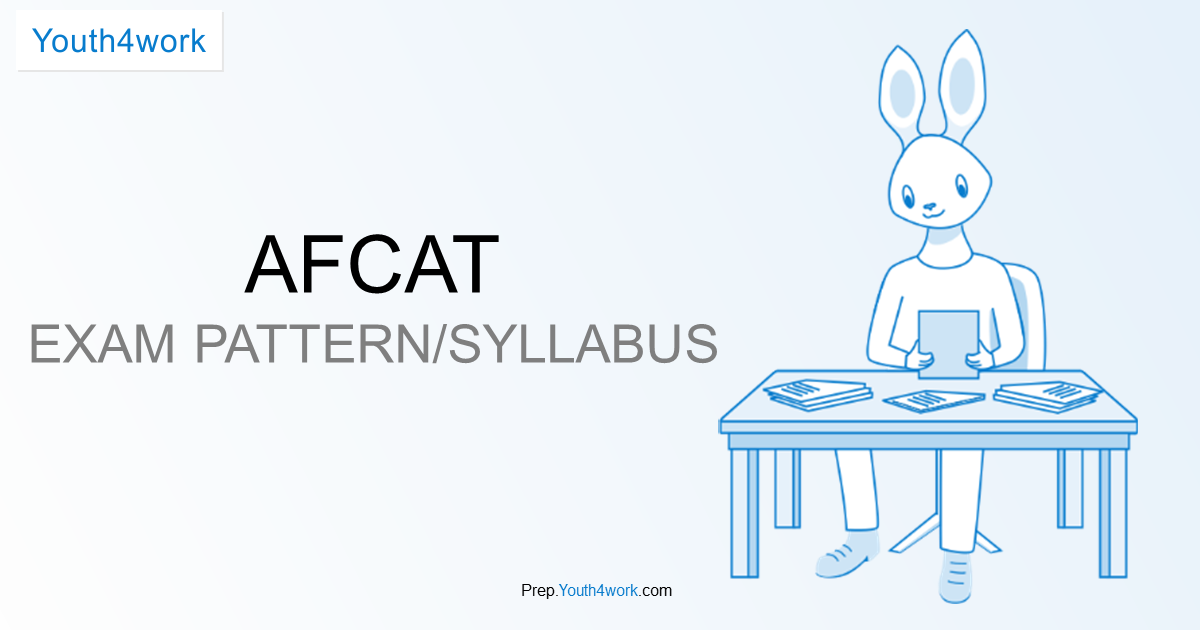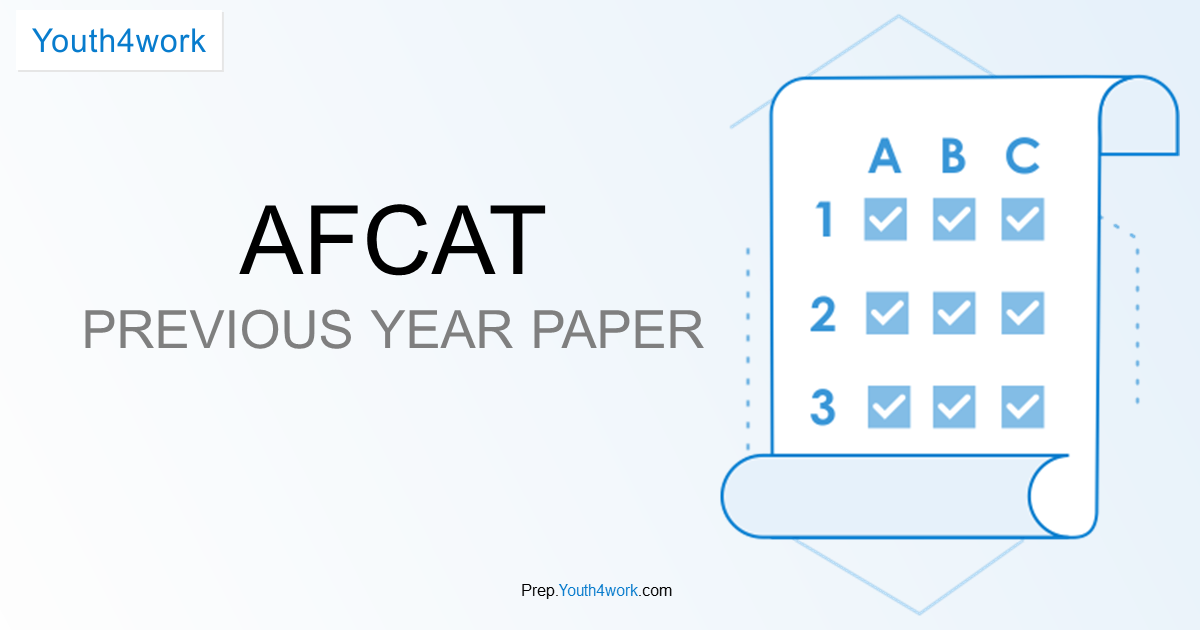Key Highlight
of Afcat

Application Fees:
Rs. 250/-

Mode of Examination:
Online (Computer Based Test)

Application Form:
(afcat 2)
June 15 - July 14, 2020

Exam Date:
(AFCAT 2)
September 19-20, 2020
AFCAT Exam Pattern, Marking Scheme and Syllabus:
Air Force Common Admission Test is the recruitment test for the posts of the Flying post (Short Service Commission), Technical Post in the Ground Staff Post, Ground Staff (Non-Technical Post). The test is conducted to recruit suitable candidates for both technical and non-technical posts in Indian Air Force. The test is conducted twice in a year, February and August.
AFCAT Notification was expected to be released in the month of June for the August examination, AFCAT Exam Dates. Basically, two exams are conducted for the recruitment, AFCAT and EKT (Engineering Knowledge Test). EKT is conducted for the candidates who have applied for the technical post to test the knowledge base required as per the designated post.
AFCAT and EKT both are an online, computer-based test. AFCAT selection process for the candidates to be recruited for the post involves 3 stages:
-
AFCAT (Non-Technical Category Posts) and AFCAT+EKT (Technical Category Post)
-
Interview by Air Force Selection Board
-
Medical Test
There will be four sections in AFCAT that will be asked from the following subjects:
-
General Awareness
-
Verbal Ability
-
Military Reasoning and Aptitude
-
Numerical Aptitude
Take a glance on the AFCAT and EKT Exam Pattern in the below table:
|
Description |
AFCAT (Both Non-Technical and Technical Post) |
EKT (Only for Technical Post) |
|
Mode of Exam |
Online |
Online |
|
Exam Duration |
120 Minutes (2 Hours) |
45 Minutes |
|
Total Number of Questions |
100 |
50 |
|
Maximum Marks |
300 |
150 |
|
Sections in Exam |
4 sections
|
3 sections
|
Key Points of AFCAT Exam Pattern:
-
AFCAT is an online, computer-based test.
-
The candidates who are applying for the non-technical posts will have to appear for AFCAT and the candidates who are applying for the technical post will have to appear for both AFCAT and EKT (Engineering Knowledge Test).
-
The duration for AFCAT is 2 hours whereas EKT will be for 45 minutes. Both exams will be conducted in two shifts in the English Language.
-
There will be 100 questions in AFCAT and 50 questions will be asked in EKT (Engineering Knowledge Test).
-
AFCAT maximum marks are 300 and maximum marks for EKT is 150.
-
There will be four sections in AFCAT (General Awareness, Verbal Ability, Numerical Aptitude and Military Aptitude) and 3 sections in EKT (Mechanical, Computer Science, Electrical & Electronics).
The aspirants who are looking forward to the exam should check the detailed AFCAT Eligibility Criteria, the basic eligibility is that the candidate must have secured a minimum of 60% in 12th standard along with Physics and Mathematics as the main subjects along with the Graduation Degree from any stream (For Ground Staff Non-Technical Post).
AFCAT Marking Scheme:
The negative marking is a big factor in AFCAT as well as EKT, the candidates must attempt the questions with care as they can lose marks because of wrong answers. The candidates can score a maximum of 300 in AFCAT exam and 150 marks in EKT. Both exams are conducted in the online mode, the candidates must practice AFCAT Online Mock Tests to have a glimpse of the online test.
Take a glance on the table to understand the AFCAT and EKT Marking Process:
|
Exam Name |
Sections |
Questions in Section |
Marks allotted for the section |
|
AFCAT (Both Technical and Non-Technical Posts) |
General Awareness |
20 |
60 |
|
Verbal Ability |
30 |
90 |
|
|
Military Aptitude |
35 |
105 |
|
|
Numerical Aptitude |
15 |
45 |
|
|
EKT (Only Technical Posts) |
Mechanical, Computer Science, Electrical & Electronics |
50 |
150 |
-
3 marks will be awarded for each correct answer in both AFCAT and EKT.
-
1 mark will be subtracted from the score for every wrong answer given.
-
There is no penalty of marks for leaving the questions unanswered.
AFCAT Syllabus:
As there will be two exams for the candidates applying for the Technical Posts in Indian Air Force, Engineering Knowledge Test (EKT) is another test that will test the candidate’s capability required for the post. AFCAT will have questions from the four subjects whose detailed syllabus is provided here:
- General Awareness:
Current Affairs, History, Sports, geography, art and culture topic, Environment, culture, defence, International affairs, politics, civics, basic science etc.
-
Verbal Ability:
Basic Grammar, comprehension, fill in the blanks, tenses, error detection, sentence completion, synonyms and antonyms, vocabulary etc.
- Reasoning and Military Aptitude:
Odd one Out, Spotting Embedded Figures, missing figures, blood relations, Venn diagrams, analogy, pattern completion, dot situation analysis, coding and decoding, sequencing, rotated blocks, data interpretation, spatial skills etc.
- Numerical Aptitude:
Simplification, percentage, profit and loss, average, decimal fraction, ratio and proportion, simple interest, compound interest, time and distance, time and work
EKT (Engineering Knowledge Test) Syllabus:
This test is conducted to test the knowledge base of the candidate that is mandatory for the required post. The topics for the syllabus of EKT is given here:
-
Fundamental Engineering:
Engineering Physics, Engineering Mathematics, and Engineering Drawing, Control Engineering, Telecommunication Systems, Electrical Engineering, Radar Theory, Instrumentation, Antenna, and Wave Propagation, and Microwave Engineering
-
Computer Science Engineering:
Information Technology, Network Theory Design, Analog, and Digital Electronics, Computer Networks, Switching Theory, and Electronic Devices
-
Mechanical Engineering:
Thermodynamics, Fluid Mechanics/Hydraulic Machines, Engineering Mechanics, Materials Science, Thermodynamics, Manufacturing Science, and Machine Drawing
-
Electrical & Electronics Engineering:
Microwave Engineering, Analog, and Digital Electronics, Electronic Devices, Telecommunication Systems, Microwave Engineering, Control Engineering, and Electrical Engineering
Youth4work Prep Tests
Online practice tests for competitive exams – are very unique and popular among aspirants. Aspirants can take self-designed mock-tests as well as practice for sections and topics separately. Youth4work’s unique and proprietary technology is helping lakhs of aspirants to reveal personal details on what are the strength areas of aspirants for any exam and also suggest how they can improve the performance.
Downloads
Case Study, Notes, Previous Year Paper
Discussion Q & A's of
Youths with similar talents will answer your query.












